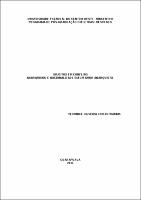| Compartilhamento |


|
Use este identificador para citar ou linkar para este item:
http://tede.unicentro.br:8080/jspui/handle/tede/77| Tipo do documento: | Dissertação |
| Título: | SUJEITOS EM CONFLITO: ANARQUISMO E NACIONALIDADE EM UM AMOR ANARQUISTA |
| Título(s) alternativo(s): | não consta |
| Autor: | Wamms, Veronice Oliveira Cristo  |
| Primeiro orientador: | Martins, Ricardo André Ferreira |
| Resumo: | Miguel Sanches Neto (2005) se apropria do recurso do hibridismo da linguagem, juntando a literatura e a história para contemplar a narrativa da saga de imigrantes italianos, que vêm para o Brasil, em 1890, para fundar uma colônia anarquista em Palmeira, no Paraná. Para tanto, ao compor o enredo, fala de um amor poliândrico entre três homens e uma mulher. Contudo, ao assim fazê-lo pelo recurso memorialístico de personagens históricas e fictícias, o autor revela como pano de fundo os discursos que circundam questões como as relações de poder entre os próprios sujeitos da narrativa com seus pares e o confronto destes indivíduos com as ideologias da família, da religião e do Estado. E é por meio desse paradoxo do desejo de unificação e de nacionalização de um grupo de pessoas tão diferentes entre si em torno de um mesmo ideal, é que sobressai a atmosfera de conflitos entre os sujeitos. A presente dissertação discute a relação discursiva entre língua e o conceito de nacionalismo como constitutivos da identidade de um povo a partir da observação dos entrecruzamentos do discurso histórico com o ficcional, bem como a relação dialógica da obra com os processos que fundem literatura e história para construir o conceito de nacionalidade, a partir da desconstrução do passado como forma de interpretar o presente. A análise dessa obra literária instaura efeitos de sentido pela sua construção narrativa e ressalta os lugares de onde se reproduzem os processos de dominação ainda recorrentes na sociedade contemporânea. A linguagem narrativa empregada desnuda discursos que conflitam o ideal de uma nação igualitária e fraterna com discursos que ideologizam reflexos da cultura dominante. Pela rememoração do passado nacional, ao contrário dos romances saudosistas, o autor representa nesta obra uma visão crítica e no nível da ficção sonda os sentidos dos dizeres desconhecidos na memória e na história viva. |
| Abstract: | Miguel Sanches Neto appropriates the appeal of hybridism of language, literature and history together to contemplate the narrative of the saga of immigrants who come to Brazil, in 1890, to speak of a polyandrous romance between three men and one woman. However, to do this by the memory resource of historical and fictional characters, the author reveals how the literary plot backdrop the discourses surrounding issues such as power relationships between the subject of the narrative with their peers and the confrontation of these individual-duos with the ideologies of family, religion and the Estate, all representative of a dominant cultural power. And it is through this paradox of the desire for unification and nationalization of a group of people so different from each other around a common ideal that stands out the atmosphere of conflict between the subject and their identities. The present dissertation discusses on the discursive relationship between language and the concept of nationalism as constituting the identity of a people, from the observation of the narrative of Miguel Sanches Neto (2005), by intersecting the historical-documentary discourse with the fictional one, as well as the relationship of the work with dialogic processes that fuses literature and history to build the concept of nationality, from the deconstruction of the past as a way of interpreting the present. The analysis of the literary sense effects introduces for its narrative construction, as well as through it point out the places where they reproduce the processes of domination still recurring in contemporary society. The narrative language employed by Miguel Sanches Neto reveals speeches that conflict the ideal of an egalitarian and fraternal nation with discourses that spread ideological reflects of the dominant culture, such as subjectivity, individualism, private property. It is therefore as Linda Hutcheon (1991, p. 35) a form of "questioning the relationship between history and reality about the relationship between reality and language". On the other hand, from the point of view of the recollection of the past, the national author, unlike nostalgic novels, represents in this work a critical vision of that past, as affirms Lukács (2009) "exhuming the buried sense" or as White (1994) deconstructing the "petrified" directions in social memory. |
| Palavras-chave: | nacionalidade memória literatura e história nationality memory literature and history |
| Área(s) do CNPq: | LINGUISTICA, LETRAS E ARTES::LETRAS |
| Idioma: | por |
| País: | BR |
| Instituição: | UNICENTRO - Universidade Estadual do Centro Oeste |
| Sigla da instituição: | UNICENTRO |
| Departamento: | Unicentro::Departamento de Letras |
| Programa: | Programa de Pós-Graduação em Letras (Mestrado) |
| Citação: | WAMMS, Veronice Oliveira Cristo. não consta. 2015. 139 f. Dissertação (Mestrado em Inglês e Literatura Correspondente) - UNICENTRO - Universidade Estadual do Centro Oeste, Guarapuava, 2015. |
| Tipo de acesso: | Acesso Aberto |
| URI: | http://localhost:8080/tede/handle/tede/77 |
| Data de defesa: | 1-Jan-2015 |
| Aparece nas coleções: | Programa de Pós-Graduação em Letras |
Arquivos associados a este item:
| Arquivo | Descrição | Tamanho | Formato | |
|---|---|---|---|---|
| PR Veronice Oliveira Cristo Wamms.pdf | 906,82 kB | Adobe PDF |  Baixar/Abrir Pré-Visualizar |
Os itens no repositório estão protegidos por copyright, com todos os direitos reservados, salvo quando é indicado o contrário.




